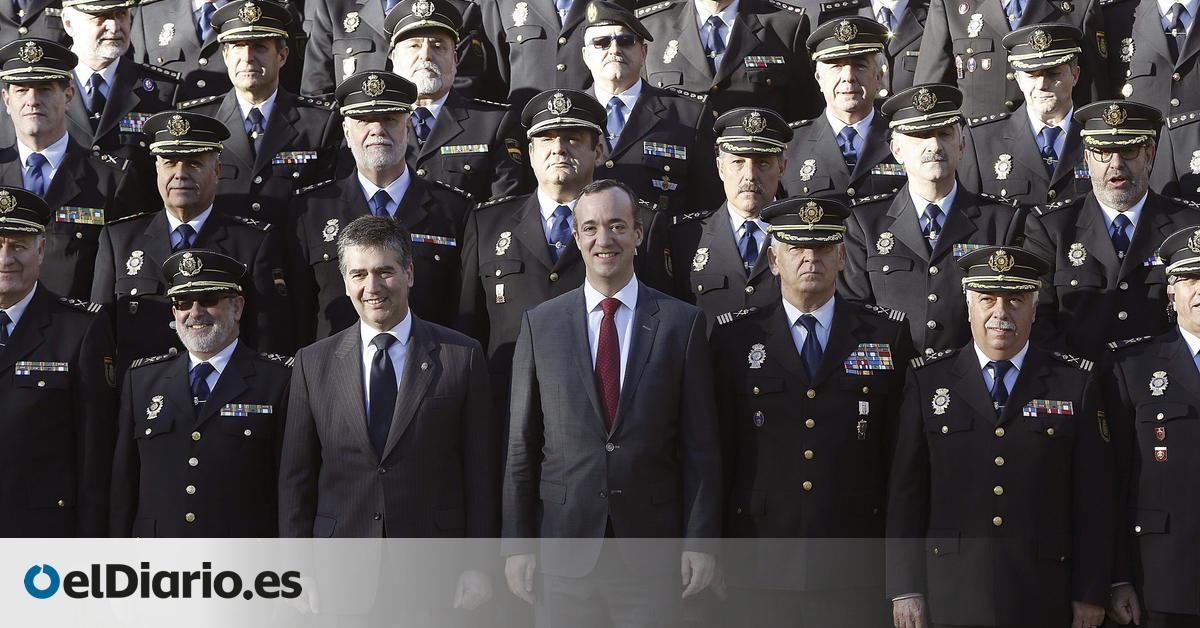
The judge of the National Court Santiago Pedraz has agreed to admit a complaint by Podemos against the former Secretary of State for Security Francisco Martínez, the former Deputy Operational Director (DAO) of the Police Eugenio Pino and other senior police officials for the alleged prospective investigations unrelated to judicial control on the people who made up that political organization.
In an order, the head of the Central Court of Instruction 5 partially admits Podemos’s complaint, as requested by the Prosecutor’s Office, and refuses to investigate the former Minister of the Interior Jorge Fernández Díaz, the former Director General of the Police Ignacio Cosidó and other officials. police.
The dirty war of the Rajoy Government is based on three corners: the original, known as Operation Catalunya, the maneuvers against Podemos, and the Kitchen operation to sabotage the judicial investigation of box B of the PP. Only the dossiers against the leftist formation had been left out of a judicial investigation.
The complaint was filed for crimes of criminal organization, seizure and disclosure of secrets, administrative prevarication and document falsification. He was also presented for embezzlement and for a crime against State institutions, although in the latter case the magistrate dismissed it as both types of crimes could not be subsumed in the events reported.
In its letter, Podemos pointed out that the defendants, under the leadership of the Secretary of State for Security, Francisco Martínez, who in turn reported periodically to the Minister of the Interior Jorge Fernández Díaz, “were in charge of carrying out prospective investigations unrelated to any interest. police, not under judicial or Fiscal Ministry control over the people who made up the Podemos political organization.”
The main objective, according to the Podemos complaint, was its subsequent leak to the media under the seal of reliability of the “police sources” and to discredit the Podemos political party in the eyes of public opinion, as well as thus attacking indemnity. of its deputies and other public officials.
This way of operating, the complaint indicates, took place in eight actions, such as the investigation of party leader Pablo Iglesias in the PISA report (on the false irregular financing of Podemos), the leak of a “false” document from an account to his name in Euro Pacific Bank Limited or the manipulation of documents or internal police records to give the appearance of legality to the actions of the defendants.
Podemos filed the complaint in the National Court and, due to the distribution rules, it fell to the Pedraz court. The prosecutor in charge of reporting, whose statement Pedraz has completely assumed, has been Vicente González Mota.
The trip to New York by Rajoy’s “mandate”
Along with Francisco Martínez and Eugenio Pino, the judge admits investigating another commissioner prosecuted in the Kitchen operation, Andrés Gómez Gordo, former advisor to María Dolores de Cospedal; as well as José Angel Fuentes Gago, Enrique García Castaño (outside the Villarejo case due to his delicate state of health) and Germán Rodríguez Castiñeira.
Fuentes Gago was charged in the Kitchen case but the case against him fell apart. This is the police officer who traveled to New York to meet with a former minister of Venezuela to obtain information about the alleged financing of Podemos and who told him, according to the recording of the meeting, that he was meeting with him on a “mandate” from Mariano himself. Rajoy. However, Rodríguez Castiñeira had not been linked to the dirty war before. He became Commissioner General of Information, head of the anti-terrorist structure in the Police.
In his order, Judge Pedraz explains that after examining the complaint and verifying that some of the facts would indeed be within the jurisdiction of the National Court and constitute a criminal offense, their admission is appropriate, although partially.
Judge Manuel García Castellón refused to investigate a dirty war against the party in the framework of the Dina case, the dissemination of information harmful to the party based on the theft of the cell phone of a collaborator of Pablo Iglesias.
Regarding the facts and people that Pedraz does not admit, the magistrate affirms that the report of the complaint does not appear to have been affirmed or substantiated by evidence that all the defendants participated in their actions with the criminal purpose that is alleged. In this sense, he says, it is not apparent that the defendants Jorge Fernández Díaz, Ignacio Cosidó, as well as the police officers Bonifacio Diez Sevillano, José Manuel García Catalán, Manuel Vázquez López and Mariano Hervás intervened in the investigation of the facts.
“It should be noted that neither Minister Jorge Fernández Diaz nor the Director General of the Police, Ignacio Cosidó, reports anything other than an assumption that due to the positions they held, they should know and authorize the facts. Said imputation is insufficient to admit the complaint against them. It is said that the director general had leaked information to the press, which is a statement that does not support the accusation of having participated in or consented to investigations against members of Parliament. All of this, the instructor warns, without prejudice to the fact that during the course of the investigation of the case, evidence against them appeared.
The ‘whatsapp’ of the number two of the Interior
On the other hand, the judge admits carrying out other procedures, such as requesting from the Central Court of Instruction 6 various information that works in the Tándem case, such as the procedures related to the examination of the content of the messages that were on Francisco Martínez’s mobile phone. In these messages, Martínez exchanges messages with a commissioner and asks him to look for negative information about the training in 2014. “Did those from Podemos have a history? Cagüenlaputa! ”He writes.
The commissioner on the other side, García Castaño, responded that the then head of the Information Brigade, Germán Rodríguez Castiñeira, would look into the databases. “The bastard German tells me that this afternoon, because looking at the 69, you can take it out but you have to look at it one by one and of course it leaves a trace,” he writes. Hence the accusation of Rodríguez Castiñeira, who would later be promoted by Juan Ignacio Zoido to General Commissioner of Information.
Regarding the proceedings requested by Podemos, the magistrate rejects the testimonial statements of journalists as they refer to the media’s sources of information, “journalism professionals are not obliged to testify about them.” He adds that it does not appear in the report of events that the media participated in the dissemination of false news knowing that they were false, so their activity is protected by professional secrecy and by article 20 of the Constitution that recognizes the right to information.
Source: www.eldiario.es

